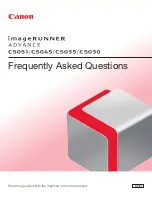
Just in case
Q: Can I transmit a document that’s extra long?
A: Yes, if the receiving fax machine is equipped to handle long documents. Many
machines have a special setting which allows them to receive documents that
exceed the normal length.
Q: Can I transmit a page from a newspaper?
A: No. A newspaper page can jam in your document feeder. First, use a copy
machine to make an appropriately sized copy of the newspaper page, then
transmit the copy.
Q: Can I transmit a page with correction fluid on it?
A: Yes, but only if the fluid is completely dry before you begin transmission.
Q: How can I be sure my fax was received?
A: Set your machine to print a confirmation report after each transmission (see
pages 3.40–3.41).
Q: I don’t want to install a dedicated phone line for my fax machine, so I’ve con-
nected the machine to a
PBX
phone system. When I get a fax call, all the phones
ring. How do I prevent this?
A: Call your
PBX
manufacturer or telephone company for assistance. They may be
able to convert one of the
PBX
lines for use only by your fax machine.
Q: Sometimes when I dial a fax call by using either the optional handset or
MONITOR
/
CALL
, I don’t hear the fax receiving tones from the other machine.
Am I doing something wrong?
A: When this happens, try pressing
START
(and then hanging up the optional
handset if you’re using it), as usual. It’s possible you’re calling an older, non-
standard fax machine that doesn’t emit answering tones. Even a few Group 3
faxes (see “Glossary,” page
AI
.7) on the market sound a sending tone but don’t
sound a receiving tone. After you transmit, call the person at the other fax
machine’s location to see if that person got your document.
Q: I inserted a document in the feeder and dialed a fax number, but my machine
didn’t transmit the document. Instead, “
** Auto Redial **
” now appears on
my
LCD
. What does this mean?
A: The remote fax machine was busy, so your machine will try the call again, auto-
matically. As long as it hasn’t stored more than 99 delayed commands (counting
automatic redials), your machine should still accept commands from you. If it
has exceeded this quantity and will accept no more commands, try cancelling
one of the delayed commands (see page 3.29). If the machine still won’t cooper-
ate, keep cancelling commands until it does.
Q: The specifications (page
AI
.2) list an average per-page transmission time, but
when I transmit a page it can take much longer. Why?
A: We base this specification on transmission of an industry-standard test docu-
ment called
ITU
-
T
Test Document 1 (sometimes also called the “Slerexe letter”).
Fax manufacturers use this method to test transmission speeds. However:
• The pages you send may be darker, or otherwise contain more information,
than
ITU
-
T
Test Document 1.
• The transmission time measured for test documents doesn’t include hand-
shake time — the time during which two fax machines “introduce”
themselves to each other and “agree on” the parameters of the call.
• The specification time is based on the use of normal resolution mode. You
may be using fine, superfine or grayscale transmission, each of which takes
longer than normal mode.
Q: What’s a default?
A: A default is a setting that your machine will always refer to if nothing else is
programmed. For example, you can set the default for this machine to send a
fax by using its memory. If you set this action as the default, that’s how your
machine will always send a fax, until you tell it to do differently.
Reports
Q: I called the number 011-555-555-1212, but not all of the digits appear on my
transmit confirmation report (
TCR
). Why didn’t the whole number appear? How
can I be sure my document went to the right location?
A: The numbers you enter using the fax keypad are temporarily stored in a mem-
ory “buffer”, and it’s only the last part of the phone number that the buffer
“remembers.” An easy way to avoid getting incomplete telephone numbers on
your printouts is to store your most frequently used numbers as one-touch keys
or speed-dial numbers. These autodialer numbers will appear in their entirety
on your
TCR
.
5.20
All manuals and user guides at all-guides.com
Summary of Contents for Dynamo MFX-2530
Page 3: ...Welcome All manuals and user guides at all guides com...
Page 67: ...This page intentionally blank All manuals and user guides at all guides com...
Page 135: ...This page intentionally blank All manuals and user guides at all guides com...
Page 145: ...This page intentionally blank All manuals and user guides at all guides com...
Page 163: ...This page intentionally blank All manuals and user guides at all guides com...
















































